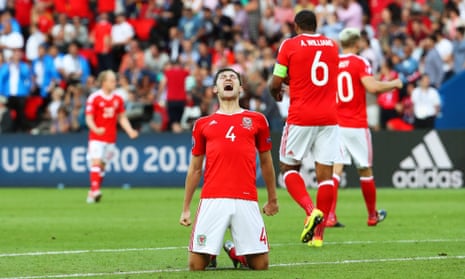In many respects, it was fitting that an own goal ought to prove decisive, because this was one of the tougher watches of Euro 2016. Wales did not care and their delight knew no limits when Gareth McAuley stretched out one of those long legs to divert Gareth Bale’s cross into his own net. The Northern Ireland centre-half wanted to be somewhere else; anywhere else.
Wales have penned the latest chapter to a historic campaign – their first at the European Championship and their first at a major finals since their appearance at the 1958 World Cup, when they reached the quarter-finals.
They now have another one to look forward to, and it will be against Belgium or Hungary in Lille on Friday.
It was a turgid and torturous game, heavy on physicality and sorely lacking in class, particularly in the final third. But as he has done so often since Wales began the long march to France, Bale helped to swing it.
He had scored in each of his country’s group games and here he produced the decisive assist. Taking Aaron Ramsey’s pass, he whipped over a vicious, low delivery from the left and McAuley – facing the wrong way and with the substitute Hal Robson-Kanu behind him – could do nothing more than apply the fateful touch.
This was a special date for Northern Ireland. On 25 June 1982, they had recorded arguably their finest ever result: the 1-0 win over Spain, the World Cup hosts, courtesy of Gerry Armstrong’s goal. There would be no repeat for them.
Their outstanding manager, Michael O’Neill, succeeded in making life difficult for Wales. He changed his team shape, detailing Jonny Evans to stifle Bale and Corry Evans to do likewise with Ramsey, and, for the most part, it worked. O’Neill was able to make a persuasive case for Northern Ireland having had the better of the game.
But Wales got the break; they forced the break with the own goal and, at full-time, they could celebrate. It was ugly, as Chris Coleman admitted, but the Wales manager would rather have that than the pain of defeat, and there were beautiful picture opportunities at the end when the players’ children came on to the field to be a part of the moment. Bale got the loudest cheer when he whooshed his daughter, Alba, into the air in front of the Wales fans.
The Northern Ireland supporters did not stop their chanting and dancing. How they have added to the colour of this tournament. Will Grigg, according to them, remains on fire. The fourth-choice striker has provided a kind of rallying point, even though he did not kick a ball, and the sideshow has summed up Northern Ireland’s exuberance.
They departed with regrets – chiefly the own goal but, also, their inability to capitalise on a couple of early chances. First, Stuart Dallas unloaded a left-footed shot after a sweeping move that Wayne Hennessey saved at full stretch and then the Wales goalkeeper tipped over from Jamie Ward.
Northern Ireland have jumped from 96th to 25th in the Fifa rankings since the last European Championship, and O’Neill has given the country a team to be proud of. Not since Billy Bingham led them to back-to-back World Cups in the 1980s has there been such a positive feeling and the fans saluted their players when they emerged 20 minutes after the final whistle. The country’s maiden European Championship is over.
This article includes content hosted on s3.amazonaws.com. We ask for your permission before anything is loaded, as the provider may be using cookies and other technologies. To view this content, click 'Allow and continue'.
Bale, as ever, was the focal point but there were different dynamics. Wales were the favourites to win and they did not find it comfortable. As O’Neill pointed out afterwards, Coleman’s team do not like it when opponents sit deep and compress the space.
There had been a revealing incident on 13 minutes, when Bale accepted possession on the right wing and, very quickly, there was a clutch of white shirts around him. Bale span out of trouble, crossed, and Ramsey almost got a touch to it. It would be a battle for the game’s marque player and he also came in for some rough treatment. Dallas and Steven Davis were booked for bad tackles on him. Bale would find the answer in the end.
Both teams played with three central defenders, which felt sophisticated, but this contest was all about brawn. There were long spells when the quality was awfully low and it was easy to highlight the individual errors, particularly in possession, where the lack of care was startling. O’Neill had predicted an “old-fashioned British game”, which materialised – but not in a good way.
Wales lacked tempo in the first half, when they failed to do anything in an attacking sense, despite Bale’s latent menace, but they were slightly better after the interval, when they came to gain footholds higher up the pitch.
The substitute, Jonny Williams, had an influence.
It spoke volumes that the winning of free-kicks close to the penalty areas was a major source of excitement. Bale won one from Oliver Norwood in the 56th minute and Michael McGovern had to dive to keep out his dipping, swerving shot. It was the Northern Ireland goalkeeper’s only save. Moments earlier, Sam Vokes had headed wastefully wide from Ramsey’s cross.
After the own goal, the game’s full-blooded, directionless nature was epitomised when Ashley Williams, the Wales captain, clattered into Jonny Williams, leaving them both in need of treatment. The former faces an anxious wait to learn the full extent of the shoulder injury he suffered, and will undergo a scan today – but O’Neill complained about what he felt was time-wasting, arguing there should have been more time added on at the end. It felt like a mercy that there was not.

Comments (…)
Sign in or create your Guardian account to join the discussion